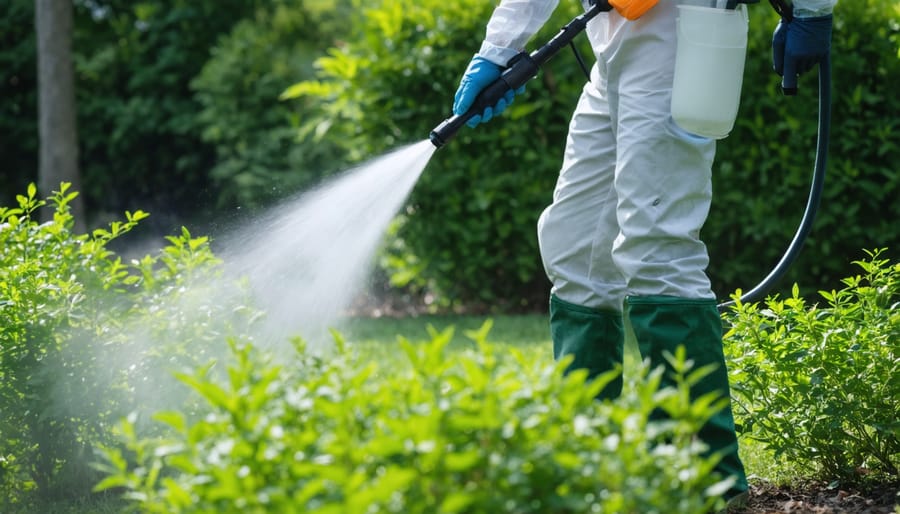Discover the power of biodegradable herbicides – nature’s answer to sustainable weed control and a cornerstone of modern earth-friendly farming methods. These innovative solutions harness natural compounds like corn gluten meal, vinegar-based formulations, and essential oils to effectively manage unwanted vegetation while protecting our soil’s delicate ecosystem. Unlike conventional chemical herbicides that can persist in the environment for years, biodegradable options break down naturally into harmless components, leaving no toxic residue behind. For gardeners seeking to maintain beautiful, weed-free spaces without compromising environmental responsibility, these eco-conscious alternatives offer a perfect balance of effectiveness and sustainability. From organic gardens to large-scale agricultural operations, biodegradable herbicides represent a crucial shift toward more sustainable land management practices that future generations will thank us for.
What Makes a Herbicide Biodegradable?
Natural vs. Synthetic Herbicides
When comparing natural and synthetic weed control options, biodegradable garden products offer significant advantages for both your garden and the environment. Natural herbicides, often derived from plant oils, vinegar, or citrus extracts, break down completely in the soil without leaving harmful residues. These earth-friendly alternatives work by disrupting weed cell structures or altering soil pH levels, making them particularly effective against annual weeds and young growth.
In contrast, conventional synthetic herbicides typically contain persistent chemicals that can remain in the soil for months or even years. While they might offer faster initial results, these artificial compounds can harm beneficial insects, contaminate groundwater, and potentially affect other plants in your garden. They may also require special handling and disposal methods, unlike their natural counterparts.
The choice between natural and synthetic options often comes down to balancing effectiveness with environmental impact. While natural solutions might require more frequent applications, they provide peace of mind knowing you’re nurturing your garden without compromising the ecosystem’s health.


Common Types of Biodegradable Herbicides
Vinegar-Based Solutions
Vinegar-based solutions are among the most popular and accessible biodegradable herbicides available to home gardeners. The active ingredient, acetic acid, typically ranges from 5% in household vinegar to 20% in horticultural-grade versions. When sprayed on weeds, the acid breaks down the waxy coating on leaves, causing them to dry out and die.
For best results, apply vinegar solutions on sunny days when temperatures are above 70°F. While regular household vinegar can be effective on young weeds, stronger concentrations work better on established plants. Consider mixing your vinegar solution with a tablespoon of dish soap, which helps the solution stick to leaves more effectively.
Remember that vinegar is non-selective, meaning it will affect any plant it touches, so apply carefully around desired plants. The good news is that vinegar breaks down quickly in soil, leaving no harmful residues behind.
Essential Oil Herbicides
Essential oils have emerged as powerful natural weed control alternatives, offering a pleasant-smelling solution to garden problems. Clove oil, with its active compound eugenol, effectively burns and dries out unwanted plants on contact. Many gardeners find success with citrus oil-based herbicides, which contain d-limonene – a natural compound that strips away the waxy coating on weeds, causing them to dehydrate and die.
Other effective essential oils include peppermint, pine, and cinnamon oil. These work best on young weeds and typically need multiple applications for stubborn perennials. While they may cost more than conventional herbicides, they’re completely safe for pets and beneficial insects, breaking down naturally within days. For best results, apply these oils on warm, sunny days when weeds are actively growing.
Corn Gluten Products
Corn gluten meal, a natural byproduct of corn processing, is gaining popularity as an eco-friendly pre-emergent herbicide. This remarkable substance works by preventing weed seeds from developing proper roots when they first sprout, effectively stopping them before they can establish themselves in your garden. As an added bonus, it’s also an excellent organic fertilizer, containing about 10% nitrogen that releases slowly into your soil.
For best results, apply corn gluten meal in early spring before weed seeds germinate. Spread it evenly at a rate of 20 pounds per 1,000 square feet of garden space. Remember that timing is crucial – it won’t kill existing weeds but will prevent new ones from taking root. After application, water it lightly to activate the compounds, then let it dry completely. This natural solution is particularly effective against common weeds like crabgrass and dandelions.
Effective Application Methods
For best results with biodegradable herbicides, timing and proper application techniques are crucial. Apply these natural weed killers on warm, sunny days when temperatures are between 65-85°F. The heat helps activate the ingredients and speeds up their effectiveness. Avoid applying during windy conditions or when rain is forecasted within 24 hours, as this can dilute the solution and reduce its impact.
Before application, identify the target weeds and ensure the surrounding beneficial plants are protected. You can use cardboard shields or plastic barriers to prevent overspray. For precise application, use a spray bottle with an adjustable nozzle or a dedicated garden sprayer. Make sure to thoroughly coat the weed leaves, as most biodegradable herbicides work through direct contact.
Many gardeners find morning application most effective, as this gives the herbicide time to work throughout the day. Apply the solution directly to dry foliage for maximum absorption. For stubborn weeds, you might need multiple applications spaced 3-5 days apart.
Remember to wear protective gear, including gloves and eye protection, even though these herbicides are natural. Clean your spraying equipment thoroughly after each use to prevent clogging and ensure even distribution in future applications.
For large areas, consider spot-treating rather than broadcast spraying to conserve product and protect beneficial insects. Some gardeners combine herbicide application with mulching to prevent new weed growth. Always follow the specific product’s instructions for concentration rates and reapplication guidelines, as these can vary among different natural herbicides.

Environmental Benefits and Safety Considerations
Choosing biodegradable herbicides isn’t just about controlling weeds – it’s about being a responsible steward of your garden and the environment. These natural alternatives break down completely into harmless components, supporting soil health rather than leaving harmful residues behind.
Unlike conventional herbicides, biodegradable options don’t contribute to groundwater contamination or harm beneficial insects like bees and butterflies. They’re also safer for pets and children who love playing in the garden. Many gardeners report feeling more confident knowing they can control weeds without worrying about toxic exposure.
However, proper application is essential for both safety and effectiveness. Always wear gloves and protective clothing, even when using natural products. Apply on calm days to prevent drift onto desired plants, and keep pets and children away from treated areas until the solution dries completely.
For best results, apply biodegradable herbicides during dry weather when weeds are actively growing. Morning application allows the solution to work throughout the day. Remember to spot-test on a small area first, as some natural ingredients can be potent despite being eco-friendly.
Store your biodegradable herbicides in their original containers, away from food items and out of reach of children. While these products are gentler on the environment, they still require responsible handling to ensure both safety and effectiveness in your garden.
Embracing biodegradable herbicides is a significant step toward more sustainable gardening practices. These eco-friendly alternatives offer effective weed control while protecting our soil, water, and beneficial garden inhabitants. By choosing natural solutions like vinegar-based sprays, corn gluten meal, or essential oil formulations, you’re not only managing unwanted plants but also contributing to a healthier environment for future generations. Remember that successful weed control often combines multiple approaches, including proper mulching, manual removal, and preventive measures. Start small, experiment with different biodegradable options, and adjust your strategy based on your garden’s specific needs. Together, we can maintain beautiful, productive gardens while being mindful stewards of our environment. Your choice to use biodegradable herbicides makes a real difference in creating a more sustainable future for gardening.




